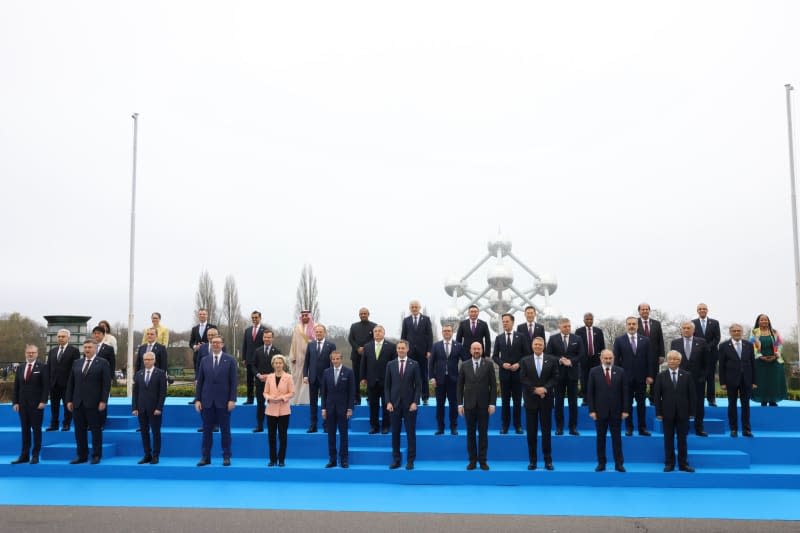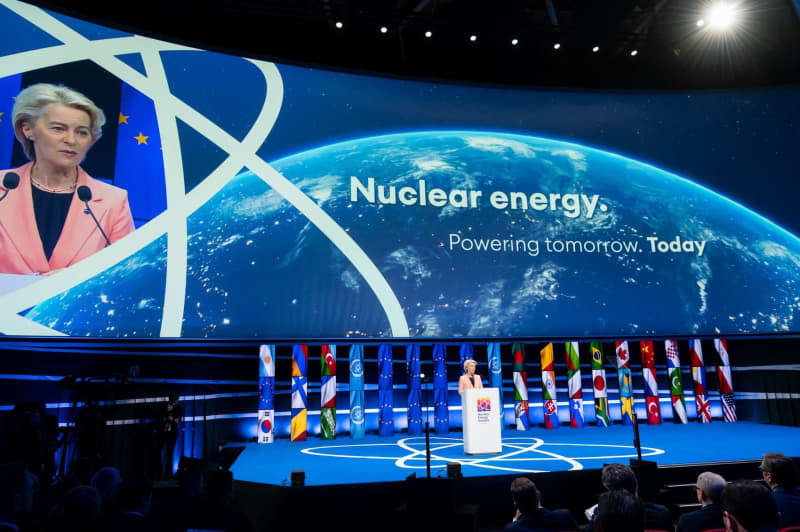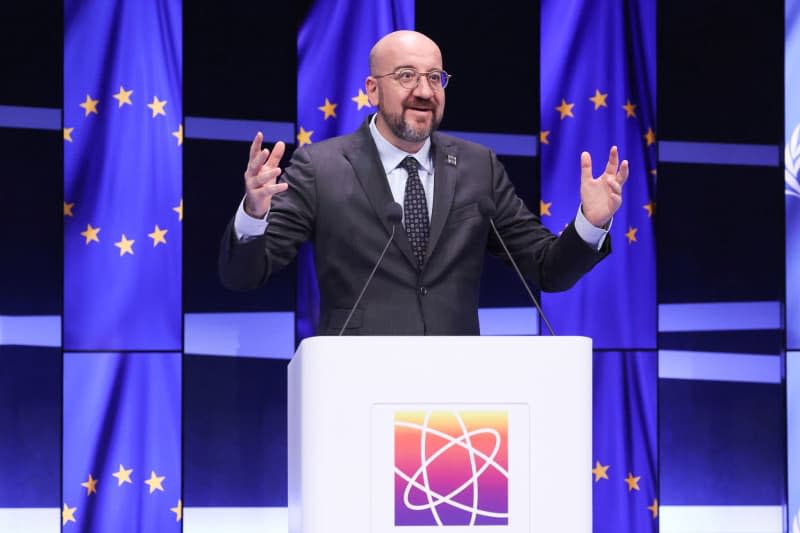Brussels energy summit suggests kernel of nuclear renaissance

- Oops!Something went wrong.Please try again later.
Promoting nuclear power was long taboo in Brussels, but a high-level Nuclear Energy Summit on Thursday sent the message that atomic energy – now touted by its champions as key to fighting climate change – is back.
At the summit in Brussels - the first of its kind - 32 countries and the International Atomic Energy Agency (IAEA) adopted a Nuclear Energy Declaration. According to a press release, the signatories affirmed their “strong commitment to nuclear energy as a key component of our global strategy to reduce greenhouse gas emissions" and "ensure energy security."
In the European Union, the nuclear debate divides member states. One group – including Germany, Spain, Austria and Luxembourg – is against its development. Another – including France, Finland, Hungary and Romania – defends the technology's potential.
Proponents of nuclear energy say it is necessary to achieve carbon neutrality by 2050, in accordance with the EU’s climate targets. But their opponents point to the safety risks and the disasters at Chernobyl and Fukushima.
In 2021, European Commission President Ursula von der Leyen made headlines by arguing the EU needed nuclear power as a “stable source” of energy. The commission went on to include nuclear in its list of sustainable investments.
Nuclear reactors are currently in operation in twelve of the 27 EU member states, although the majority are in France, where another is under construction. Slovakia is also building a new plant. Poland intends to restart its nuclear energy programme, and the Czech Republic is planning new reactors.
FRANCE: THE EU'S NUCLEAR CHAMPION
In the past two years, France has been decisive in putting nuclear back on the EU’s agenda. Fifty-six of the 100 nuclear power plants in Europe are in France, where at least 14 potential new plants are being considered for construction.
France is also the only EU member to possess nuclear weapons, after Britain left the bloc in 2020.
The country's defence ministry recently announced that it wanted to enrich material containing lithium in two reactors at a plant in Civaux, central France. The goal is to extract tritium, a radioactive hydrogen isotope used in nuclear weapons.
By early 2023, France was spearheading the launch of a “nuclear alliance” of a dozen EU members including Poland, Bulgaria, Finland and the Netherlands, with a goal to weigh in on policy to advance nuclear energy.
In February this year, France and Bulgaria signed an agreement enabling companies from both countries to participate in the maintenance of existing power plants and in new projects.
The month before, Bulgaria also signed an agreement with the United States to cooperate on a nuclear project at the Kozloduy nuclear power plant.
France’s EDF is one of the bidders for a new reactor in Dukovany, Czech Republic, along with South Korean company KHNP. Contracts are expected to be signed in late 2024 and early 2025 and the first reactor to start operating in 2036.
EUROPEAN NUCLEAR ENERGY AMBITIONS GROW
Romania intends to become a regional leader in nuclear energy, its President Klaus Iohannis said at the summit on Thursday. He emphasized that climate change represents “a global challenge” which requires coordinated action and ambitious measures.
Neighbouring Serbia does not have any experience with nuclear energy, the country's president, Aleksandar Vučić, said at the summit. He said Serbia lacked nuclear energy experts and funding. He added that Serbia is interested in getting at least four small modular reactors, but noted that it would need financial support from leading EU member states.
In Slovenia, a nuclear power plant has been operating in Krško, near the Croatian border, since 1983. It generates about 40% of the electricity produced in the country, though half of it goes to Croatia, which co-owns the plant. In November, Slovenian citizens are expected to vote in a referendum on the construction of a another nuclear power plant in Krško.
Sweden currently has six working nuclear reactors, all built in the 1980s. Six older reactors were closed down between 1999 and 2020.
The country once planned to phase out nuclear power after a non-binding referendum in 1979. But the current right-wing government is planning new reactors, and nuclear power is becoming more popular in Sweden.
RENEWABLE ENERGY STILL KEY
Despite the EU warming to nuclear power, there remains a stand-off between Paris and Brussels over substituting nuclear for renewable energy. France failed to meet EU renewables targets in 2020, but is refusing to make amends, arguing that its carbon footprint is low enough because of nuclear energy.
Many environmental activists dislike France's stance - as do EU countries including Spain, Austria, Germany and Luxembourg, which together form a “Friends of Renewables” alliance within the bloc.
German Chancellor Olaf Scholz has rejected calls for a return to nuclear energy in Germany, where the last reactors were shut down in April 2023. He has pointed to high costs and long construction times. Electricity coming from nuclear power plants costs many times more than electricity from wind power, solar energy or other production sources, said Scholz.
The content of this article is based on reporting by AFP, Agerpres, BTA, CTK, dpa, EFE, Lusa, MIA, STA, Tanjug and TT as part of the European Newsroom (enr) project.



